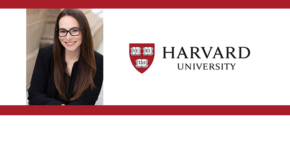
It’s Best-Of Week on The Academic Minute: In today’s segment, Alexis Redding, faculty co-chair of higher education and lecturer at Harvard University, says you have less time than you think to prepare students for success at the beginning of a new school year.
Alexis Redding is a developmental psychologist whose work focuses on the college experience and what students need to thrive. She is the Faculty Co-Chair of the Higher Education Concentration at the Harvard Graduate School of Education where she also teaches courses in student development, student affairs, and research methods for higher education. In 2024, she also became Faculty Chair of a new Professional Education course at HGSE: Mental Health in Higher Education: A Theory-to-Practice Approach for Student Well-Being.
You Have Less Time Than You Think to Prepare Students for Success
You never get a second chance to make a first impression.
In student affairs, conventional wisdom tells us that we have 6 weeks to set the tone for the student experience. But what if we overestimated that window of opportunity?
In a 2018 study that I conducted, I found that we have ten days. At most. Which means that orientation really matters.
In following 109 students throughout their first year of college, I found that even the most challenging moments were all processed through the lens of both the explicit and implicit messages they received when they arrived. Messages about values, belonging, and culture.
More than 275 days later, at the end of the year, their sense of the school and their place within it all came from those first 10 days.
So, knowing that the clock is ticking faster than we realized, what can we do to prepare students for the year ahead?
My research revealed that the single most important thing is helping students prepare for the challenges that will inevitably come by setting expectations early on – especially the loneliness and struggle to find a sense of belonging that so many students will face in their first year.
We may hesitate to talk about this reality at the start – not wanting to dampen the enthusiasm of the honeymoon period as students begin college.
When we do talk about resources that are available, like campus mental health programs, we tend to share that information at a time when students can’t imagine needing help and we often miss an opportunity to destigmatize their use by showing how common these challenges are along the way.
If we do help level set in these first 10 days, we can help create a culture where students know that it is ok to struggle and are empowered to seek support when they need it.
